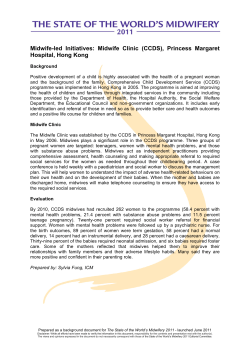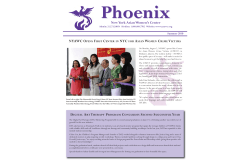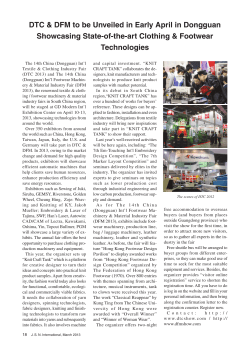
How to Succeed in Doing Business in China and India Executive Development Programme
How to Succeed in Doing Business in China and India Executive Development Programme with leading Asian and European experts 2nd to 5th August 2006 Davos / Switzerland www.davosmi.org Partners Swiss - Chinese Chamber of Commerce Swiss - Hong Kong Business Association Fudan University, School of Management, Shanghai, China Indian Institute of Management, Bangalore, India HKUST Business School, Hong Kong University of Science and Technology, Hong Kong SAR, China Sponsors AIAK Group, Free2move, Telemoney Succeeding in China and India The global market is being fundamentally reshaped by the emergence of China and India. China and India possess the weight and dynamism to transform global economy in all sectors and industries. China and India present compelling investment opportunities. But there is considerable risk involved for players who do not understand how local markets operate in each of these countries. The Executive Development Programme by the Davos Management Institute will bring together leading experts and practitioners from Asia and Europe to share their knowledge and insights about Asian markets with you. The programme is designed for Asian and European participants and provides therefore multiple opportunities for an exchange of experience and cross-cultural interactions helpful in learning about doing business successfully in India and China. We are looking forward to having you with us! Mr. Hussain Najadi Founder President, Davos Management Institute Management Summary Benefits The programme offers -an executive programme that integrates conceptual knowledge with practical experiences -faculty members of leading Asian universities and European experts -hands-on business information -workshops involving participants’ views -networking possibilities with Asian participants from executive level Who will benefit best from the programme? Directors, CXO level or below, from organisations with already existing linkages to Asia or a special interest in this field, as well as from companies evaluating a market entry in the future Duration 2nd to 5th August 2006: 10 modules Registration fee CHF 6,400.– / Euro 4,100.– net per participant, including 4 nights accommodation at the Kongresshotel Davos, course material, breakfast buffet, refreshment break in between sessions, lunches, gala dinner on 4th August Course venue Kongresshotel Davos, www.hotelkongress.ch Cancellation policy If you cannot attend this event, a replacement delegate is welcome. Written cancellation (letter or fax) till 7th July 2006 to receive a refund, less a 5% administration fee. If you cancel after 7th July 2006, no refunds will be given. Instead your fee will be converted to a DMI course voucher, equivalent to the total fee paid less a 10% administration charge. This voucher is transferable within your organisation and must be redeemed within 1 year of issue. DMI reserves the right to amend the published programme or speaker. In the event of course cancellation by DMI due to unforeseen circumstances, DMI is liable only for full refund of fees paid. Programme Overview Module 1 Macroeconomic dynamics of Asian markets and key business trends in Asia Module 2 Assessment of Chinese economic and political prospects Module 3 Assessment of India’s economic and political prospects Module 4 China’s corporate sector – governance, competition, future transformations Module 5 China’s private sector – entrepreneurial behaviour in the context of structural economic change Module 6 Dealing with Asia’s family-owned businesses Module 7 Developing new competitive strategies for the transformed global market – lessons learned in China Module 8 India’s corporate sector and competitive strategies Module 9 Managing Asian markets: How to leverage Europe’s comparative advantage? Module 10 Conclusions: Succeeding in the New Global Market Business Networking Day What participants of the 2005 programme on Islamic Banking think: “I attended the Summer Islamic Banking and Finance Programme, in August 2005, in Davos through Davos Management Institute; after my amazing experience I can say ‘DMI’ is the only source to make development and enhancement of our skills in the growing Islamic finance industry. I strongly encourage to participate and not to miss this opportunity in 2006.” Salman Al Jishi President, Salman Group, Kingdom of Saudi Arabia Programme Wednesday 2nd August Manu Bhaskaran, Asia Chief Economist, Davos Management Institute Dr. Yuwa Hedrick-Wong, Chief Strategist, Davos Management Institute Module 1 Macroeconomic dynamics of Asian markets and key business trends in Asia -Global megatrends and their Asian characteristics -Where do China and India stand in relation to Asian growth? -Intraregional trade and business impacts of economic integration -Production sharing networks and the emergence of a “Pan-Asian Supply Chain” -Assessment of risks Module 2 Assessment of Chinese economic and political prospects - Demystifying China’s economic growth: real drivers, myths, hidden weaknesses, imbalances and implications -China’s long-term growth dynamics, prospects and risks: assessment of demo graphic trends, changing patterns and drivers of growth in the long term, new areas of competitive advantage; China’s potential roles as an investor abroad Module 3 Assessment of India’s economic and political prospects -Demystifying India’s economic growth: real drivers of growth, myths, hidden weaknesses, imbalances and their implications -India’s long-term growth dynamics, prospects and risks: assessment of demo graphic trends, changing income and employment patterns and their effects on growth of the consumer market, new areas of competitive advantage, under estimation of India as a manufacturing powerhouse “Islamic banking is becoming mainstream business and the programme provided by Davos Management Institute valuable background information on its role and function by internationally recognised experts in this field.” August Hatecke, Credit Suisse Thursday 3rd August Module 4 China’s corporate sector – governance, competition, future transformations Prof. Xiongwen Lu, Executive Associate Dean, School of Management, Fudan University, Shanghai -Chinese companies: change in composition, ownership structure, governance, and competitive strategy, strategies for growing abroad -Challenges and opportunities for foreign investors and businesses Module 5 China’s private sector – entrepreneurial behaviour in the context of structural economic change Prof. Yihong Yu, Vice Director, Institute of Industrial Economics, School of Management, Fudan University, Shanghai -China’s changing business context: industrial structure, urban/rural structure, regional structure -Structural change, entrepreneurial behaviour and business opportunities: evidence and case studies Module 6 Dealing with Asia’s family-owned businesses Michael McGaughy, Business Consultant -Analysis of family-controlled businesses in China and South-East Asia -Strategies for dealing with family-controlled business groups in Asia and China Module 7 Developing new competitive strategies for the transformed global market – lessons learned in China Prof. Larry Dongxiao Qiu, Associate Professor of Economics, Hong Kong University of Science and Technology, Hong Kong SAR -Sector-based strategy analysis and exploration -Region-based strategy analysis and exploration “The Islamic Finance Summer School 2005 in Davos provided a practical and informative insight into the world of Islamic Banking.” Eridani Jusat Head Fixed Income Trading & Sales, Treasury Capital Markets, Bank Muamalat Malaysia Berhad Friday 4th August Module 8 India’s corporate sector and competitive strategies Prof. Rishikesha T. Krishnan, Professor of Corporate Strategy, Indian Institute of Management, Bangalore -Business implications of the growing domestic market in India for foreign investors and companies -Indian companies’ potential global competitiveness and implications for India’s export capability Module 9 Managing Asian markets: How to leverage Europe’s comparative advantage? Prof. Dodo zu Knyphausen-Aufsess, Professor of Human Resource Management and Organisation, University of Bamberg Dr. Andreas Moerke, Head of Business and Economics Section, DIJ – German Institute for Japanese Studies, Tokyo -What are Europe’s comparative advantages in the Asian markets? -How can European companies effectively leverage these comparative advantages? Module 10 Conclusions: Succeeding in the New Global Market Manu Bhaskaran, Asia Chief Economist, Davos Management Institute Dr. Yuwa Hedrick-Wong, Chief Strategist, Davos Management Institute Saturday 5th August Business Networking Day Business Network Asia Hussain Najadi, Founder President, Davos Management Institute “We all suffer from a shortage of time, but I can honestly say that the time spent by me attending the Summer Islamic Banking and Finance Programme, in August 2005, in Davos was a critical step forward in my obtaining a deeper level of understanding of the workings of Islamic finance. Working with colleagues in this industry from all over the world stimulated me to step up our efforts at producing new and innovative investment solutions for our customers. We have already seen the business payback.” Andrew Broadley Division Head – NCB Investment Services, National Commercial Bank, Jeddah, Saudi Arabia The Lecturers Mr. Manu Bhaskaran Asia Chief Economist, Davos Management Institute -Coordinator of the Asian business of the Centennial Group, a strategic advisory firm based in Washington, DC -Member of the Competition Appeals Board, Singapore -Member of the Board of Advisors at the Centre for Analytical Finance, Indian School of Business, Hyderabad -Adjunct Senior Research Fellow at the Institute of Policy Studies, Singapore Dr. Yuwa Hedrick-Wong Chief Strategist, Davos Management Institute -MasterCard International’s economic advisor in Asia / Pacific -Guest lecturer at the Graduate School of Business, University of Chicago, Singapore (2000 – 2001) -Visiting professor at the School of Management, Fudan University, Shanghai (2005) Prof. Dodo zu Knyphausen-Aufsess Professor of Human Resource Management and Organisation, University of Bamberg -Honoured with the 1992/93 German Research Foundation Fellowship, the 2002 TheoPrax Foundation Teaching Award and the 2002 Faculty of Social Sciences and Economics Teaching Award -Member of the Academy of Management -Member of the Munich Circle, an International Telecommunications Research Society -Member of the Roland Berger Strategy Consultants Academic Network “I found the Summer Islamic Banking and Finance Programme, in August 2005, in Davos to be interesting and useful for the development and furthering of our skills in the growing Islamic finance industry…” Mohammed Al-Muqbel Gulf Finance House, Bahrain Prof. Rishikesha T. Krishnan Professor of Corporate Strategy, Indian Institute of Management, Bangalore -Chairperson of Research & Publications and of IIMB’s Centre for Development of Cases & Teaching Aids -Consultancy activities for British Telecom, DaimlerChrysler, Wipro, Siemens and the Governments of India and Karnataka -Member of the Confederation of Indian Industry (CII) National Panel on Intellectual Property, R&D, Technology and Innovation -Member of the executive committee of the Strategic Management Forum of India, and on the board of the Indian Institute of Health Management Research, Jaipur Prof. Xiongwen Lu Executive Associate Dean, School of Management, Fudan University, Shanghai -Responsible for the International MBA programme (a joint degree programme with the Sloan School at MIT and the Hong Kong University) and the Executive MBA programme (a joint degree programme with the University of Washington in St. Louis) -Standing Director of the Chinese Marketing Association -Research Fellow at the Center for Asia and the Emerging Economies, Tuck School of Business, Dartmouth College; Visiting Scholar, Sloan School of Management, MIT (1997), and Visiting Scholar, the Fisher College of Business, the Ohio State University (1995) Michael McGaughy Business Consultant -Present President/Analyst East Bridge Advisors, San Francisco -Fifteen years of Asian investment and capital market experience including investment management, buy- and sell-side analysis, corporate finance, and investor relations -Successfully built public and private equity research teams and products in five Asian countries including Mainland China, SE Asia, and the Indian subcontinent Dr. Andreas Moerke Head of Business and Economics Section, DIJ – German Institute for Japanese Studies, Tokyo -Until 2005 Senior Research Fellow at DIJ. Field of research: Corporate Governance Systems, Internationalisation Strategies and Industrial Organisation, especially in the Automotive and Financial Sector -Former lecturer for the MBA course in International Management at Hosei University, Tokyo Prof. Larry Dongxiao Qiu Associate Professor of Economics, Hong Kong University of Science and Technology, Hong Kong SAR -Specialist on China’s economic development, its emerging industry and business environment -Prof. Qiu has published extensively on Chinese economic and industry issues in leading international journals -Consultant to the United Nations Development Program, the Hong Kong SAR Government, and the Asian Development Bank Prof. Yihong Yu Vice Director, Institute of Industrial Economics, School of Management, Fudan University, Shanghai -Leading expert on the transformational dynamics of China’s economy, focusing especially on its changing industrial structure - Awarded with the Science and Technology Prize from the National Planning Commission and the Shanghai Government - Visiting professorships at the Sloan School of Management, MIT; St. Anthony’s College, Oxford University; Aoyama Gakuin University, Tokyo; China-Europe Management Center, Belgium; State University of New York at Albany, New York The Partner Universities Fudan University, School of Management, Shanghai, China A school that specialises in business education and research, Fudan University’s School of Management has inherited the University’s 100-year history of traditions, profound academic thinking, and long-standing cultural study. Since business education was resumed two decades ago, following the open-door policy in China, the school has developed a strong reputation. Over the years, Fudan University has advanced management research and business education. In the area of international academic cooperation and exchanges, the School of Management is unmatched in China. Indian Institute of Management, Bangalore, India The Indian Institute of Management, Bangalore, was established in 1973. Building on the base of its highly accomplished faculty and motivated student body, IIMB has evolved into a premier centre for management education and research. The flagship Postgraduate Programme in Management (PGP) and Fellow (Doctoral) Programme in Management (FPM) are very highly rated, and IIMB alumni occupy senior managerial and academic positions across the globe. IIMB consistently figures among the top business schools in India in domestic and international surveys. HKUST Business School, Hong Kong University of Science and Technology, Hong Kong SAR, China From its inception in 1991, the Business School at Hong Kong University of Science and Technology has aimed at the highest standards possible in its field. The faculty comprises professors from leading global institutions, who are actively advancing the innovative research and analysis done there. Reflective of HKUST Business School’s pursuit of excellence, several globally recognised business publications and educational institutions have ranked it highly: 2005 International Rank: # 2 Executive MBA Programme in the world (Financial Times) # 1 Executive Education Programmmes in Asia Pacific (Financial Times) # 1 in Finance Research in Asia Pacific (Arizona State University) The Organiser Davos Management Institute Davos Management Institute is a private initiative. It was established in 2005 by Asian executives to bring inquiring minds together and to provide analysis and clarity to the questions posed by the new global order. Conceived by a team with vast experience in international business and finance, the Institute seeks to advance the interaction between East and West as well as between strategists and economists. We believe that conveying a truly multicultural and multidisciplinary perspective is the best way to create change. We want to empower executives with the tools and information needed in a dynamic and practical setting. CEO, Founder President Davos Management Institute Mr. Hussain Najadi -Chairman & CEO of AIAK Group of Companies, Malaysia and Switzerland -Founder and former Director of Euro Asia Center at INSEAD, Fontainebleau (1977 – 85) -Appointed Member of Board of Advisory of Global Finance Forum (GFF), of Switzerland, founded by leading economists in Switzerland and headed by Prof. Dr. Bernd Schips Contact Head Office Davos Management Institute P.O. Box 1435 St. Antonsgasse 4 CH-6301 Zug Telephone +41 41 729 36 26 Fax +41 41 729 36 35 info@davosmi.org, www.davosmi.org Regional Office Davos Management Institute 22nd Floor Menara Haw Par Jalan Sultan Ismail 50250 Kuala Lumpur Telephone +60 3 2026 8188 Fax +60 3 2026 0388 info@davosmi.org, www.davosmi.org
© Copyright 2025













